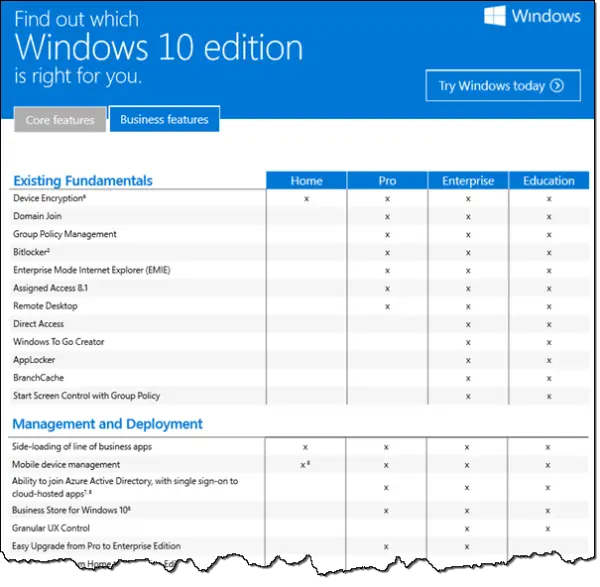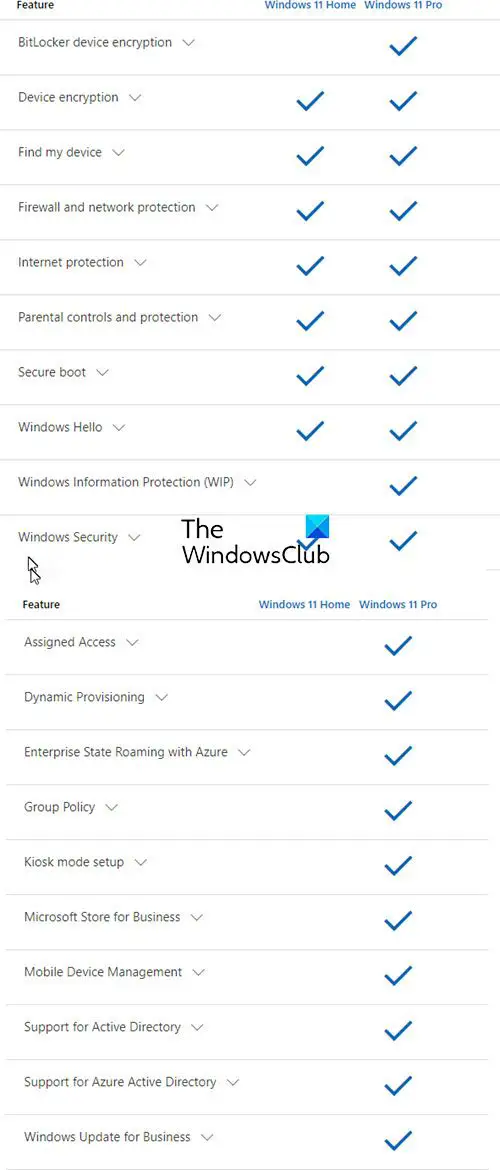Windows 11 is free for an upgrade for genuine installs of Windows 10. Windows 10 is free for an upgrade for genuine installs of Windows 7 SP1 and Windows 8.1. You get to upgrade to distinct editions of Windows 11/10, based on the editions of Windows OS you are running. If you are running Windows 10 Home, for example, you will be upgraded to Windows 11 Home. If you are running Windows 8.1 Pro, you will be on Windows 10 Pro. If you want Windows 10 Enterprise or Education, you will have to buy them before upgrading.
Differences between Windows 10 and Windows 11

Windows 10 editions comparison chart
There are six Windows 10 editions:
- Windows 10 Home
- Windows 10 Pro
- Windows 10 Educational
- Windows 10 Enterprise
- Windows 10 Mobile
- Windows 10 Mobile Enterprise
Windows 11 vs Windows 10; Which is better?
This article will not talk about mobile editions as the features for mobile editions are pretty limited compared to normal editions. We will keep the focus on the first four desktop versions: Windows Home, Windows Professional, Windows Education, and Windows Enterprise.
The edition you get upon upgrading depends upon which edition you are using currently. Read our discussion on which edition of Windows 10 you will get for more details.
Windows 10 Editions features compared
Windows 10 has plenty of new features, and they vary by the editions. Some features are common to all the editions while some advanced features are reserved for higher editions that may not be eligible for free updates. Microsoft has released a chart showing what features will be available in each edition.
The basic features will be available in all four editions. These include the much-awaited Cortana, Microsoft Edge, Windows Defender, Fast Start with HiberBoot feature, TPM support, Battery Saver, and basic Windows Update feature. Continuum is also available in all editions so you can switch from PC to tablet mode and vice-versa.
Personalization settings such as Lock Screen, wallpapers, themes, and customizing of sounds, etc. are also available in all editions of Windows 10. You can also download and add themes to your computer or tablet.
Basic security is available to all editions in the form of Windows Defender and Windows Firewall.
Device Encryption will be available to all editions if the device hardware supports it.
Windows Hello is also available in all editions. Windows Hello, however, requires special hardware to work with facial impressions, Iris inspections, and fingerprints. Your computer must have those special hardware before Windows Hello can be used.

Coming to advanced features, Windows Domain is not available in Windows 10 Home. You will have to have at least Windows 10 Pro to use this feature. Similarly, Group Policy Editor will also not be available in the Home edition. Enterprise, Pro, and Education will feature GPE and Domains compatibility.
However, Start Screen Control with group policy will not be available even in Pro. Home too won’t have it. It is available only for Enterprise and Education editions.
Other features absent from Windows 10 Home and Windows 10 Pro are Direct Access, Windows To Go Creator, Applocker, and Branchcache.
Coming to Windows Update, the basic updates will be available to all editions. The long-term servicing branch would be available only to the Enterprise edition. Windows Update for business is available to all editions except Home. Enterprise Editions will be able to defer installing updates, whereas Home users do not have that option. Windows 10 Pro also lets customers take advantage of the new Windows Update for Business, which will reduce management costs
The much talked about Device Guard will not be available for Home and Professional edition.
You can download the PDF Comparison Chart released by Microsoft from our servers.
Windows 11 Home and Pro editions comparison chart
There are four Windows 11 editions:
- Windows 11 Home
- Windows 11 Pro
- Windows 11 Educational
- Windows 11 Enterprise
While most of the features are similar to the ones available in Windows 10 editions, here is the comparison chart for Windows 11 Home vs Windows 11 Pro editions.

Based on the features we have seen in this post, there is no doubt that Windows 11 has a lot more to offer, although you may find that the Taskbar and Start are missing many features that we present in Windows 10.
Read: What is Windows 11 SE?
Should I upgrade from Windows 10 to Windows 11?
Windows 11 has a lot of new features to offer, especially from a security point of view, although you may find that the Taskbar and Start are missing many features that we present in Windows 10. So it might be a good idea to upgrade to Windows 11 as it is free. However, if you are satisfied with the way Windows 10 is working for you, there is no real urgency to upgrade.
Which Windows 11 version is the best for personal use?
Windows 11 is available in different editions, including Home, Pro, Enterprise, and Education. Windows 11 Pro is for professionals, Enterprise is for enterprises or organizations, and Education is for students and teachers. All these three editions have some advanced features that are not available in Windows 11 Home. But Windows 11 Home edition has all the features that are required for a regular user. Hence, Windows 11 Home edition is the best for personal use. You can upgrade your license later from Microsft Store.
Now Read: How to upgrade from Windows 10 Home to Pro.